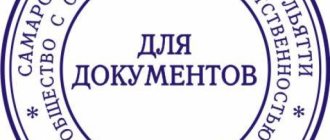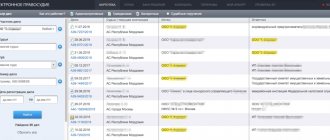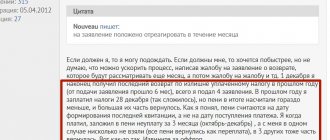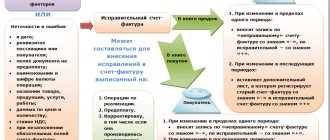Grounds for re-inspection
A repeat tax audit can be carried out in an organization in two cases.
Firstly, this is possible if a higher tax authority decides to monitor the activities of the tax inspectorate and evaluate the quality of its on-site audit. For this purpose, the head of a higher tax authority (his deputy) may decide to conduct a repeat on-site audit of the organization. This follows from the provisions of paragraph 5 of paragraph 10 of Article 89 of the Tax Code of the Russian Federation.
Situation: can an organization appeal the results of a re-inspection? A repeat audit was appointed by a higher tax authority as part of control over the tax inspectorate. At the same time, the audit team includes employees of the same tax office.
Answer: yes, it can, but it is hopeless.
On the one hand, the Tax Code of the Russian Federation does not prohibit the inclusion of tax inspectors who conducted the initial audit (paragraph 5, clause 10, article 89 of the Tax Code of the Russian Federation). In addition, tax authorities at all levels represent a single centralized system (Article 30 of the Tax Code of the Russian Federation). Therefore, the head of a higher tax authority can include in the inspection staff both his own department (for example, a regional tax department) and subordinate tax inspectorates. There will be no violation if inspectorate employees are involved in the re-inspection as executors.
On the other hand, the purpose of a repeated on-site audit, which is carried out by a higher tax authority, is not to re-inspect the organization, but to monitor the activities of the tax inspectorate (paragraph 5, clause 10, article 89 of the Tax Code of the Russian Federation). This goal will not be achieved if the inspection team consists entirely of employees of the inspectorate that conducted the initial inspection. In such circumstances, during the re-inspection, the inspection staff will monitor themselves. Such an inspection can be qualified as a repeat on-site inspection conducted by the inspectorate. And its implementation is unacceptable (clause 5 of Article 89 of the Tax Code of the Russian Federation).
However, the courts do not see any violations in the involvement of tax inspectors in audits that are carried out by decision of a higher tax authority (see, for example, the decision of the Supreme Arbitration Court of the Russian Federation dated May 26, 2008 No. 6707/08, the resolution of the Federal Antimonopoly Service of the Far Eastern District dated September 20, 2011 No. Ф03-4283/2011, Ural District dated October 18, 2011 No. Ф09-6642/11, dated October 27, 2010 No. Ф09-8198/10-С3).
As part of such an audit, a higher tax authority can check a period not exceeding three years preceding the year the decision to conduct it was made (paragraph 3, clause 10, article 89 of the Tax Code of the Russian Federation). For example, if the decision to conduct a repeat tax audit was made in 2015, then the audit period may include 2012, 2013 and 2014. A higher tax authority does not have the right to check the organization’s activities for 2011 (and previous years) as part of such an audit.
Secondly, the basis for a repeat audit may be the submission of an updated tax return, which reflects the amount of tax to be reduced.
The decision to conduct a re-inspection of the updated declaration must be made by the inspectorate that has already conducted an inspection for that tax and for the period for which the updated declaration was filed (paragraph 6, clause 10, article 89 of the Tax Code of the Russian Federation). Even if the organization submitted an updated declaration after moving to another inspectorate. Moreover, if at the time of changing the location of the organization, the previous inspection conducts an on-site inspection, including the tax and the period for which the updated declaration was submitted, then a repeat inspection may not be carried out. In this case, the tax obligations of the organization, taking into account the clarifications, can be verified as part of the ongoing audit. If the tax and the period for which the updated declaration was submitted are not covered by the current inspection, then a repeat on-site inspection may be carried out by the previous inspection. Such clarifications are contained in the letter of the Federal Tax Service of Russia dated March 6, 2012 No. AS-4-2/3639.
During the repeated inspection, the inspection will analyze only the period for which the updated declaration was submitted (paragraph 6, clause 10, article 89 of the Tax Code of the Russian Federation). Moreover, this period cannot extend beyond the three calendar years preceding the year of the decision to order a repeat inspection (paragraph 3, clause 10, article 89 of the Tax Code of the Russian Federation). Thus, the tax inspectorate will not be able to conduct a repeat audit if in 2012 the organization submits an updated declaration for 2008. The specified year is not included in the three-year period allotted to the inspectorate for re-inspection. Consequently, the organization will not be able to receive a refund or credit for such an updated declaration. By this time, the period during which an application for the return of the overpayment can be submitted will have already expired (Clause 7 of Article 78 of the Tax Code of the Russian Federation). This conclusion follows from letters of the Ministry of Finance of Russia dated April 8, 2010 No. 03-02-07/1-152 and dated April 8, 2010 No. 03-02-07/1-153.
Situation: can the tax inspectorate conduct a repeat audit if an organization has submitted an updated calculation of advance tax payments?
Answer: no, it cannot.
One of the grounds for conducting a repeat tax audit is the submission of an updated declaration, which reflects the amount of tax to be reduced (paragraph 6, clause 10, article 89 of the Tax Code of the Russian Federation). Calculations of advance payments are not equivalent to tax returns. Therefore, if an organization discovers an error not in the declaration, but in the calculation of advance payments, the clarifications provided do not constitute grounds for ordering a repeat inspection.
In what cases is a re-inspection carried out?
On-site re-inspection is carried out by these authorities:
- Higher tax authority. A repeat audit is carried out to check the work of the tax authority that carried out the first event.
- The tax authority carrying out the first audit. The event is held only by decision of the authority. It is assigned when the payer sends an updated tax return with a reduced tax amount. The subject of the audit is exclusively the circumstances that led to a reduction in the amount of accrued tax.
- Main tax authority. He can also organize events during the liquidation or reorganization of a company.
As a rule, control activities are carried out by a higher authority.
What exactly can be checked
When repeating the event, specialists must comply with these conditions:
- The findings of the courts regarding a current tax return should not be overestimated.
- Only those circumstances that led to the clarification of the tax return are checked. In particular, to reduce accrued taxes.
When carrying out a repeated inspection, violations may be discovered that were not identified during the first event. In this case, sanctions will not be applied to the company. An exception is made for offenses that arose as a result of a conspiracy between the payer and an official representing the tax office (based on paragraph 10 of Article 89 of the Tax Code).
What to do if the results of the previous check are not yet available
Based on the results of the inspection, a report is drawn up. It takes some time to compile it. Is a repeat event held if the results of the previous one are not yet available? Paragraph 10 of Article 89 of the Tax Code of the Russian Federation states that a re-inspection is carried out with the aim of analyzing the productivity, legality and validity of decisions of a lower structure. This approach is confirmed, among other things, by paragraph 5 of Resolution No. 5-P of the Constitutional Court Resolution.
That is, the higher authority does not check the results, but the process of the control event. Therefore, the presence or absence of an act does not matter. Even if the test results are not ready, the subject of the repeated event is present. In addition, the article of the Tax Code of the Russian Federation does not indicate that the second inspection should be carried out based on the results of the first.
Request for payment of taxes
In the event of additional taxes being assessed as a result of a desk tax audit, the taxpayer is sent a demand to pay the appropriate amount of taxes and penalties.
This requirement, in essence, is informing the taxpayer about the results of a desk audit. If the tax authorities did not notify the company about the results of the audit or did not send a notice of payment of taxes and penalties, but immediately went to court, then the servants of Themis will refuse their claim.
No company is immune from desk audits. But not everyone can pass the test painlessly. Therefore, you need to know about the nuances of its implementation in order to avoid many problems.
Read on topic: Letter from the tax office: what to do?
Appealing the decision of the tax inspectorate in court
You may also be interested in: Tax audit, the Federal Tax Service issued a requirement to provide documents
How is the check carried out?
The repeated event has a number of restrictions. In particular, only papers related to the calculation and payment of taxes are checked (clause 12 of Article 89 of the Tax Code of the Russian Federation). Specialists can request documents for a period not exceeding 3 years. The repeated nature of the event does not affect the order of its holding.
The results of the second check may not coincide with the results of the first. For example, a higher authority may detect other violations. However, sanctions will not be imposed for them. An exception is the discovery of falsification of the results of the first control event, which arose as a result of a conspiracy between the company and tax representatives. In this case, organizations may impose penalties, arrears, and penalties. The corresponding provision is contained in paragraph 10 of Article 89 of the Tax Code of the Russian Federation.
Can specialists, as part of a repeat event, request papers that were previously provided to inspectors? Paragraph 5 of Article 93 states that a company may not transfer those documents that were previously provided as part of desk and on-site inspections. However, this provision is relevant only for papers that were transferred to the inspection after January 1, 2010 (based on paragraph 15 of Article 7 of Federal Law No. 137 of July 27, 2006).
The inspector has the right to re-request these papers:
- Documents previously submitted in the form of originals, which the company later took back.
- Papers submitted to the inspection that were lost due to force majeure.
The relevant provisions are specified in paragraph 5 of Article 93 of the Tax Code of the Russian Federation. They are relevant for both regular and repeat inspections.
Can a higher authority inspect a company if there is a decision?
Let's consider the situation. An initial event was carried out, based on the results of which a decision was made. It was assessed by the court and entered into legal force. Can a repeat action be carried out by a higher authority in this case? Maybe, but the inspector does not have the right to make decisions that change the conclusions of the judicial act.
The Tax Code of the Russian Federation does not directly prohibit a repeat inspection when the results of the previous one were assessed in court. However, sometimes control measures contradict the Constitution. In particular, this happens when a new decision comes into conflict with a judicial act. The corresponding provision is contained in the decision of the Constitutional Court No. 5-P of March 17, 2009.
Transfer procedure
What did the Service regulate in its letters? Within 15 days from the date of completion of additional control measures, the results of the audit are drawn up in the form of an addendum to the tax audit report, which reflects: the beginning and end of additional measures, information about the actions taken by the auditors, a description of the evidence received, as well as the conclusions and proposals of the auditors elimination of violations.
The addition to the inspection report, together with the materials received as a result of the clarifying inspection, must be delivered to the taxpayer against signature within five days, and if delivery is not possible, it must be sent by registered mail.
note
Additional control measures can only be aimed at collecting new evidence relating to offenses identified during a tax audit, or clarifying the evidence itself, but not at searching for new offenses.
Within 15 days from the moment the organization receives the additions to the act, it has the right to submit written objections to it (clause 6.2 of Article 101 of the Tax Code of the Russian Federation). The obligation to draw up an addition to the tax audit report applies when making decisions based on the results of tax audits completed after September 3, 2018 (clause 1 of the Federal Tax Service letter No. ED-4-2/ [email protected] ).
The official form of such a document has not been approved at the moment, however, the letter of the Federal Tax Service dated November 7, 2021 No. ED-4-15 / [email protected] approved the recommended form of addition to the tax audit report (form according to KND 1165215) (Appendix No. 3), which may already be in use by controllers.
Additional questions
Is the right to take an event relevant in relation to the branches of the company if a general inspection has been carried out before? It all depends on what taxes were the subject of the previous procedure. If a comprehensive analysis of all federal, state and local taxes has been ordered, an on-site audit will be illegal. The basis is paragraph 4 of paragraph 10 and paragraph 5 of Article 89 of the Tax Code of the Russian Federation.
If the subject was individual taxes, it is possible to organize an additional on-site event. Its subject is unverified taxes. Such an event is not considered repeated (based on clause 10 of Article 89 of the Tax Code of the Russian Federation).
IMPORTANT! On-site inspections can only concern regional and local payments to the treasury.
Based on the results of an audit of one tax, can an inspector request an updated declaration for another payment? Yes. During the repeated procedure, unrecorded data and errors that underestimate the tax may be discovered. In this case, you need to recalculate the latter. The company itself must submit the updated declaration. Otherwise, the inspectorate will take over the matter. The relevant rules are contained in paragraph 1 of Article 31 of the Tax Code of the Russian Federation and letter of the Ministry of Finance No. 03-02-07/2-209 dated December 21, 2009.
Possible number of re-checks
Even if two events were carried out in a year for different taxes and periods, if there are sufficient grounds, an unlimited number of audits can be carried out.
Desk and field tax audits
According to Russian laws, legal entities and individuals are required to pay taxes on their business activities. Before paying independently calculated amounts, companies and individual entrepreneurs submit declarations and calculations to the local tax authority, which indicate and document the funds payable to the budget.
From the moment the taxpayer submits documents to the tax authority, a mandatory period of desk audit begins, when specialists check the correctness of your calculations without leaving their office.
For some reason, the tax office decides to come to your company and independently review your statements - that is, to carry out the so-called VNP - on-site tax audit. For example, if she suspects that you are evading taxes by falsifying some data.
In some cases, the Federal Tax Service has the right to come to you again. We are no longer talking about a simple GNP, but about a repeated one.
Comparative table of distinctive features of tax audits:
| Cameral NP | Visiting NP | Repeated GNP |
| Location | ||
| Conducted on the territory of the inspection body | As a general rule, tax officials come to your office. If there is none, it is allowed to bring all the documentation to the tax office. It is also common practice to rent an office near your business. | It is also carried out at the legal address of your business. The Federal Tax Service Inspectorate, which conducted your first tax inspection, is obliged to “bring things to a close” during the second inspection, even if you have changed your address and now belong to a different Federal Tax Service Inspectorate |
| What is being considered | ||
| Each submitted document, calculation or declaration is reviewed | The review is selective. The Federal Tax Service does not check everything, but focuses on individual periods and taxes | Only that information (taxes and periods) that has already been considered during the first IRR |
| Who decides | ||
| The verification begins automatically from the moment the document is submitted. Permission from the management of the Federal Tax Service is not required for this. You will not be notified about the start of consideration of papers. | Possible only with the permission of the head of the inspection or his deputy. You will be notified of your arrival | If a higher authority checks the local tax inspectorate, the decision is made by the head of the regional tax office. If you are subject to a clarification check, the decision is made by the head of the local structure or his deputy |
| How long does it last | ||
| Three calendar months. On the fourth day a decision is made | No more than two months in general. Extension possible up to four or even six months | |
| How often do they happen | ||
| After each document submitted | Limit – two inspections per year | Unlimited number of times |
| Certificate of conduct | ||
| In general it is not provided. If the inspection finds errors or discrepancies, it will ask you for clarification. Or asks to submit an amended declaration. If the explanations are unsatisfactory, the tax office may draw up a report and a decision on the results | The certificate of conduct is not optional, but mandatory. You will be given it on the last day of the inspection, indicating the subject and duration | A certificate is also issued with information about the nature of the inspection (repeated) and the decision made. In general, the repeated nature of such an inspection does not affect its form. |
Repeated measures during liquidation or reorganization
Repeated inspections during liquidation and reorganization are regulated by paragraph 11 of Article 89 of the Tax Code of the Russian Federation. The procedure is almost completely similar to standard repeated measures. The decision to conduct it is made by the head of the inspectorate to which the company is a member.
Is it possible to schedule a repeat desk audit? No, since its subject is tax reporting. It is impossible to check the same papers twice, without sufficient grounds. The corresponding position is set out in the resolution of the Federal Antimonopoly Service of the North-Western District No. A66-594/2008 dated September 26, 2008. Exceptions are cases when the company has submitted updated reports with a reduced tax amount. The accuracy of the organization's calculations is double-checked by inspectors.
FOR YOUR INFORMATION! Based on the results of the repeated event, as with the standard procedure, a report is drawn up with its results. It indicates the defects found or their absence.
Largest taxpayers
The legislation establishes criteria for the largest taxpayers, according to which they are recognized as such (order of the Federal Tax Service dated May 16, 2007 No. MM-3-06 / [email protected] ). Criteria include:
- indicators of financial and economic activity for the reporting year from the company’s accounting and tax reporting;
- signs of interdependence and influence of the taxpayer on the economic results of activities of interdependent persons;
- availability of a special permit (license) for the right of a legal entity to conduct a certain type of activity, for example, the production of medicines (Article 12 of the Federal Law of May 4, 2011 No. 99-FZ (as amended on December 27, 2018));
- conducting tax monitoring.
The status of the largest taxpayers at the federal level, which are subject to tax administration in the interregional inspectorates for the largest taxpayers, is assigned to companies whose total income received for the year (for any year of the previous three years, not counting the last reporting year) exceeded 35 billion rubles (subclause. 1, 8 Criteria). The amount of income is determined according to the Financial Results Report.
The largest taxpayers, regardless of income, may include:
- credit organisation;
- insurance and reinsurance organization;
- mutual insurance company;
- insurance broker;
- professional participant in the securities market;
- non-state pension fund.
If the amount of income a company receives in a year is in the range from 10 to 35 billion rubles, then it is classified as one of the largest taxpayers at the regional level, i.e. it is subject to tax administration in the interdistrict inspectorate of the Federal Tax Service of Russia for the largest taxpayers (clause 6 of the Criteria).
note
Please note that organizations that apply special tax regimes are not recognized as major taxpayers. Companies (except for credit companies), in respect of which an arbitration court has decided to declare the debtor bankrupt and a bankruptcy procedure has been introduced, cease to belong to the category of the largest taxpayers (clause 9 of the Criteria).







